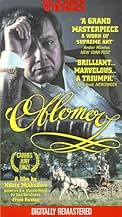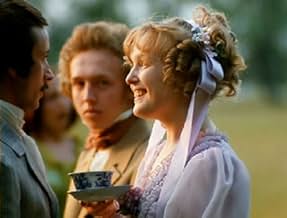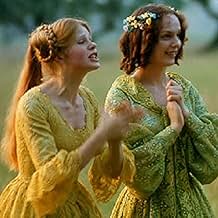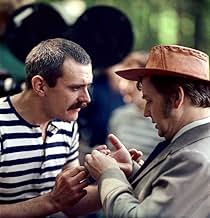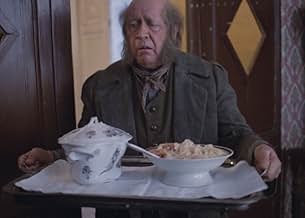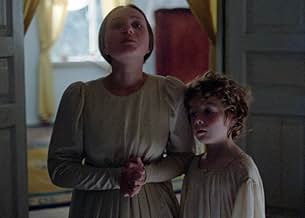Quelques jours de la vie d'Oblomov
Titre original : Neskolko dney iz zhizni I.I. Oblomova
NOTE IMDb
7,6/10
2,7 k
MA NOTE
Ajouter une intrigue dans votre langueSt. Petersburg, mid 19th century: the indolent, middle-aged Oblomov. He sleeps much of the day. His boyhood companion, Stoltz, now an energetic and successful businessman, adds Oblomov to hi... Tout lireSt. Petersburg, mid 19th century: the indolent, middle-aged Oblomov. He sleeps much of the day. His boyhood companion, Stoltz, now an energetic and successful businessman, adds Oblomov to his circle and introduces him to Olga.St. Petersburg, mid 19th century: the indolent, middle-aged Oblomov. He sleeps much of the day. His boyhood companion, Stoltz, now an energetic and successful businessman, adds Oblomov to his circle and introduces him to Olga.
- Réalisation
- Scénario
- Casting principal
- Récompenses
- 2 victoires et 2 nominations au total
Yelena Kleshchevskaya
- Katya
- (as Ye. Kleshchevskaya)
Galina Shostko
- Olga's aunt
- (as G. Shostko)
Gleb Strizhenov
- The Baron
- (as G. Strizhenov)
Evgeniy Steblov
- Oblomov's father
- (as Ye. Steblov)
Evgeniya Glushenko
- Oblomov's mother
- (as Ye. Glushenko)
Nikolai Pastukhov
- Stoltz's father
- (as N. Pastukhov)
Avis à la une
This story of a 19th-century Russian land owner (Oblomov) begins slowly, with scenes that puzzle and seem almost contradictory. The beginning denies you any emotional involvement, but as the film progresses you're dragged into Oblomov's psyche.
Early on there's a scene where two young boys are spinning themselves around in the seat of a swing to get dizzy. That's almost the sensation you get as you find yourself completely immersed in Oblomov's world. Not that you're reeling or disoriented, but that everything else becomes shut out.
The film moves along at a genteel pace, and, in that unique Russian way, when emotions burst through the societal veneer, you're completely clobbered. It's like someone sneaking up from behind and conking you on the head. The human condition being what it is, it's impossible not to identify with Oblomov. For anyone who has ever deliberated, doubted, or procrastinated--in other words, everyone--this film provides layers and layers of meaning, gently filtered through a portrait of Russian gentry.
To my surprise, I find myself wanting to call this a great film. It seems an improbable tag for such a slender story. But the crafting of the film is absolutely top tier: acting, cinematography, pacing--everything, really. Put that together with the haunting subtext, and you get a film well worth seeing.
Early on there's a scene where two young boys are spinning themselves around in the seat of a swing to get dizzy. That's almost the sensation you get as you find yourself completely immersed in Oblomov's world. Not that you're reeling or disoriented, but that everything else becomes shut out.
The film moves along at a genteel pace, and, in that unique Russian way, when emotions burst through the societal veneer, you're completely clobbered. It's like someone sneaking up from behind and conking you on the head. The human condition being what it is, it's impossible not to identify with Oblomov. For anyone who has ever deliberated, doubted, or procrastinated--in other words, everyone--this film provides layers and layers of meaning, gently filtered through a portrait of Russian gentry.
To my surprise, I find myself wanting to call this a great film. It seems an improbable tag for such a slender story. But the crafting of the film is absolutely top tier: acting, cinematography, pacing--everything, really. Put that together with the haunting subtext, and you get a film well worth seeing.
10katvyhh
Exquisite work.
Leaves you changed and moved.
Very respectful to the book and to the era, fantastic cast.
in many occasions, an adaptation is a war against novel. modifications, lost of book spirit, innovations or only errors. in this case, the masterpiece of Goncharov is key for open the Nikita Michalkov universe. recipes - respect for text, good cast, precise performance, Slav flavor. only is at right place. the drama of poor Oblomov is reconstructed, piece by piece, level by level, with grace, respect and love. more than a film, it may be a portrait or homage. and basic victory is science to transform the story in warm drawing of feelings and expectations, sins and fall. it is not a surprise. only new demonstration of Mikhalkow subtle art. and this is, for each of his films, the sign who makes difference, who gives a kind of aura to every movie and births air of refined melancholia.
10mbloxham
A definitively executed rendering of a work of romanticism; it's depth largely exceeding what can be attained from within a culture, such as the north american, that has either lost its history, or never had one; this to warn it is unlikely to be appreciated by one not already steeped in the film or theater of europe or the slavs. To someone who is, a sweet but not light experience: its lessons and philosophies cannot be contained, but envelope the reader, in his own life.
Ivan Goncharov's novel Oblomov is a classic of Russian literature and a true masterpiece. It's a sociocritical and philosophical work and it anticipates the formation of the Russian revolution by showing the apathy, phlegm and decadence of the impoverished Russian (landed)gentry at the end of 19th century. The main character Oblomov is a very lovable yet weak-willed and frail nobleman. He lives in St.Petersburg and lives off the income of his manor which is far away and run-down. For days Oblomov just stays in his bed, thinking and lamenting about all the things he should do but his lethargy prevents him from taking care of these problems. He reflects on hectic daily life and what is important, the meaning of life. His counterpart is his best friend Stolz, a German. Stolz is vibrant, fun-loving and burning for action and he tries to pull out Oblomov from his lethargy but it's a very hard task. One day Oblomov falls in love... The book was written in the tradition of new realism in Russian literature, like Tolstoi, Dostojewski or Turgenjew. The interpretation of the story varies a lot between then and nowadays and critics are still arguing what Goncharov's real intention was. Many people see the novel as a swan song on Russian class society and tsardom; and it is essentially a Fin de Siècle novel. Oblomov is like the representative of a class that has outlived itself, a dinosaur of Russian nobility. It's not a coincidence that Stolz is German, he's a symbol for the modernistic and educational ideas that came from the West at that time. I agree with this interpretation on the whole, looking at the novel in the context when it was written. The novel was published in 1858, that was only 3 years before the official abolition of serfdom trough Alexander I, the beginning of extended reforms which couldn't prevent the progression of the coming revolution as we know today. Lenin later spoke at a party convention about "Oblomovism" in reference of the overthrown system, threatening that the days of Oblomovism are over. You'll even find this term today in Russian thesaurus. The other interpretation is that today many celebrate Oblomov as an icon of refusal and idleness and point out the more philosophical aspects of the story. In the days of globalisation and people worshipping "shareholder value" and the mighty dollar, Oblomov can indeed be seen as the hero of all deniers. Many of his thoughts in the novel are universal and pose questions to us that are more up to date then ever before it seems. The movie captures the essence of the story in a great way and is free of any Soviet propaganda influence you might detect in similar films; it's very accurate to the original work and one of the best literature film versions I've ever seen. The cast is wonderful, the cinematography is top notch and fits the moods of the story perfectly, sometimes dreamy (in the great outdoor scenes), sometimes realistic. Oblomov's character comes over every bit as lovable, melancholic and pensive as he is portrayed in the book. The end is a little abrupt and an important part of the story is missing. That's a pity and the reason I give this film 8 instead of 10 points; I wonder if the director encountered some problems there or if their budget was cut short for any reason. Who knows. Check this movie out, it will be hard to find I guess but it's a great work and a refreshing change when one is only used to modern films. Of course this gem should be watched in cinema and I still hope that my local art cinema will someday organise a Nikita Mikhalkov retrospective so I get the chance to see it on the big screen.
Le saviez-vous
- GaffesWhen Oblomov is writing his farewell letter to Olga, the candles are nearly blown out by the wind, but the light shed remains the same.
- ConnexionsFeatured in Oleg Tabakov. Smotryu na mir vlyublyonnymi glazami (2015)
Meilleurs choix
Connectez-vous pour évaluer et suivre la liste de favoris afin de recevoir des recommandations personnalisées
- How long is A Few Days from the Life of I.I. Oblomov?Alimenté par Alexa
Détails
Contribuer à cette page
Suggérer une modification ou ajouter du contenu manquant

Lacune principale
By what name was Quelques jours de la vie d'Oblomov (1980) officially released in India in English?
Répondre
